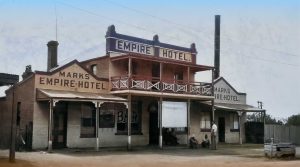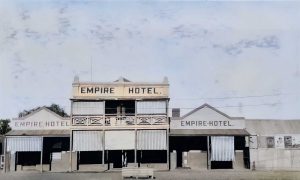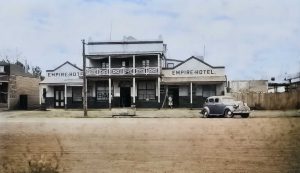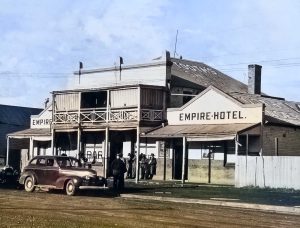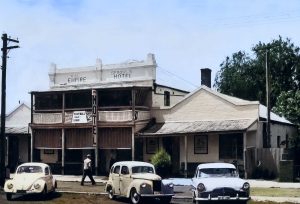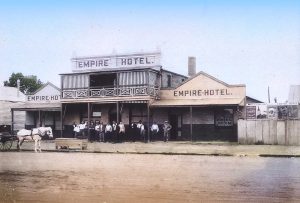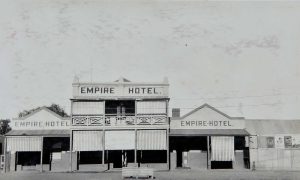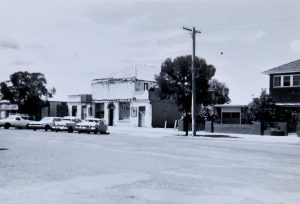Cobar has had two hotels called the Empire, but the second was a replacement of the first, built on the same land on Barton Street, retaining the licence. A story exists that the first Empire burnt down – why not, so many hotels did – but in reality, the building was demolished and much of the material deliberately burned.
The Empire did have a near miss with a fire in June 1923 when several outbuildings were destroyed, but fortunately, the hotel cook, Mrs Stamp, raised the alarm. It was also threatened in February 1945 when the roof was badly damaged by a cyclone. In November of that year, there was a cyclone of a different sort. Accountant Andrew Campbell, business partner in the Empire and several other country and city hotels, was charged with and convicted of failing to keep proper books and accounts. He seems to have conspired with a liquor merchant to divert spirits from their proper destination in the city to the Empire, keeping them off the books. It came to light when the residents of Mosman complained they couldn’t get rum at their local hotel. Defence argued that recent changes in legislation were confusing but the judge wasn’t having it. Andrew Campbell was fined the hefty sum of £150.
But the building, with its attached hall that had, at various times, served as a billiard saloon and the Cobar Stock Exchange, survived largely intact until its deliberate demolition. In the meantime, it saw a variety of owners and licensees, as well as an array of local drinkers.
The first Empire was built by Hopkin Lewis. He and his wife, Matilda, were the proprietors and licensees. Hopkin was also a partner in the young Castlemaine Brewery with Edward Freeman, as well as being an auctioneer and the first mayor of Cobar, elected when the township was proclaimed in 1884. Alas, he became unwell in 1895. He travelled to Sydney to seek medical treatment, but died there. He was brought home to be buried in Cobar cemetery, sharing a grave with his mother-in-law, Matilda Boots, who had died on the 22 August 1894. They were later joined by Hopkin’s daughter, Charlotte Lewis, who died on the 22 August 1895. Note those dates and imagine what it was like for her mother.
Charlotte Lewis died as a result of a riding accident – she was thrown form her horse and struck her head on the road. She was carried into the Star Hotel and a doctor was sent for. Thought at first to be only stunned, she didn’t regain consciousness and died hours later. The accident had happened on the corner of Lewis Street, named for her father.
Matilda Lewis carried on the Empire as licensee for five more years before moving to Sydney.
Other notable empresses include Mrs Smiles and Mrs Chaston, both of whom carried on Matilda’s legacy of a respectable, well-run hotel. Mrs Smiles moved from the Empire to the Great Western in 1914, which was seen as a step up. At the Great Western, she was not only landlady, but became a mother-figure to the long-term boarders.
In July 1918, Arch McLaughlin, formerly the publican of the Court House Hotel, took up the Empire Hotel and almost as quickly put it down again. Although the Empire kept its licence through the catastrophic copper mining collapse that followed World War I, the McLaughlins evidently decided it wasn’t worth the risk. The owner of the building, Michael Angelo Padula, was obliged to take out the licence to keep the place operational. He didn’t run it himself – he was no longer a young man – and one or two other interests, such as owning and running the town’s limited power supply plant (turned off each night as the clock chimed midnight), took up his time.
The licence changed hands several times during the 1920s. In 1929, it was relinquished by Charles McKeon, who had no say in the matter. He had been convicted three times for offences against the Liquor Act, and so was banned from holding a licence for three years. The offences were for allowing out-of-hours drinking on the premises – a common fault of Cobar publicans across the decades. Mr McKeon doesn’t seem to have been too fussed. He didn’t even bother to turn up for the hearing.
The licence then went to Mr R.E. Marks. What comment can be made – were his parents oblivious or did they do it on purpose?
In the 1930s, Michael Angelo’s son Geurino “Paddy” Padula took it on. The Padulas sponsored a Golf Cup that brought players from Bourke and the surrounding district every year to Cobar (and to the Empire Hotel).
The Empire, along with the other hotels and businesses of Cobar, suffered the downswings caused by war and mine closures, but also enjoyed the upswings of the 1950s when wool prices brought prosperity to the graziers. With the re-opening of the CSA Mine in the 1960s, the old place boomed again. This was the era when the Grand modernised and the Empire was rebuilt. The second Empire offered counter meals but no longer offered accommodation. It was run for many years by the Wray family, who had interests across the district, including owning and training race horses. When Travern Wray died, his funeral was held at Nyngan Race Course with the hearse doing a run with Wray’s last ‘race’ called over the speaker.
Today

Empire Hotel
While it no longer features that grand old facade that was the face of the Empire Hotel for so many years, the pub itself is still a welcoming, comfortable and very popular place to eat and drink in Cobar.
The Past

The Pubs & Breweries of Cobar
Eighteen hotels are known to have existed in Cobar. Fortunately, they did not all exist at the same time as it may have been harder to get things done.


